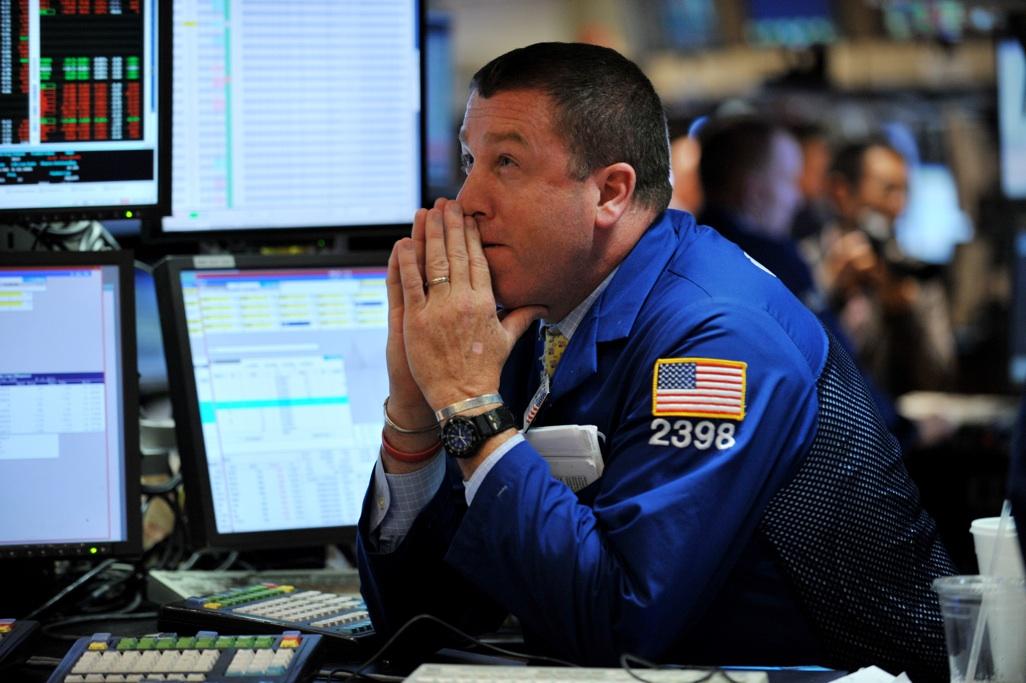Does market crash on Wall Street equal recession?
A stock specialist watches prices on the floor of the New York Stock Exchange on August 4, 2011. The Dow Jones Industrial Average plunged 4.3 percent Thursday, its worst one-day drop in more than two years, as global markets melted down over fears of another world economic downturn.
Stock market crashes are rarely happy events for human beings (except, of course, for short sellers who guessed right).
But what's the impact of a sustained and steep market decline on the overall economy?
It's a good question, considering all the volatility that we've had on Wall Street since the debt ceiling debacle, last week's Standard & Poor's downgrade of U.S. debt, and a growing realization that the global economy is in trouble.
Writing in the New York Times, James Stewart takes up this question today, and the answer is pretty interesting:
David Bianco, chief investment strategist for Merrill Lynch Bank of America, told me this week that “the market is collapsing faster than any fundamentals would warrant.” The risk of another recession has soared, by Mr. Bianco’s estimate, to an 80 percent probability, one that would be worse than the 1991 recession. He noted that there had been only three instances when such a steep market decline was not followed by recession: 1966, 1987 (after the October stock market crash) and 1998 (after the implosion of Long Term Capital Management.) “Confidence is shaken and rapidly falling,” he said, a problem worsened by falling stock prices.
Stewart's excellent piece examines the interesting correlations between the current economic and market situation in the U.S., and "the events of 1937-38, the so-called recession within the Depression."
“The parallels to what is happening now are very strong,” Robert McElvaine, author of “The Great Depression: America, 1929-1941” and a professor of history at Millsaps College, told Stewart.
Then as now, policymakers were struggling with "how and when to turn off the fiscal stimulus and monetary easing that had been used to combat the initial crisis," he writes.
Back then, there was a growing belief that the U.S. economy had finally emerged from the Great Depression. With debt soaring, F.D.R. and Congress eased off the stimulus, raising taxes and slashing government spending in an effort to balance America's budgets. Meanwhile, with inflation picking up the Fed tightened credit.
The result?
- The Dow Jones dropped 49 percent from its peak in 1937.
- Manufacturing output fell by 37 percent.
- Unemployment surged from 14 to 19 percent.
- Price declines triggered deflation.
So the general consensus of this history lesson has been that policymakers moved too quickly, and too aggressively, to try to allow a struggling U.S. economy recover with less government help.
Are we in the same boat today?
Nobel Prize-winning economist Paul Krugman makes a compelling case that Washington is focused on the wrong economic problems.
To be sure, slow growth is a long way from the Great Depression. And an unemployment rate of 9.1 percent looks positively rosy compared to the darkest days of the 1930s.
But at any rate, Stewart's piece today is a good reminder of the lessons of history. Check it out.
Every day, reporters and producers at The World are hard at work bringing you human-centered news from across the globe. But we can’t do it without you. We need your support to ensure we can continue this work for another year.
Make a gift today, and you’ll help us unlock a matching gift of $67,000!
